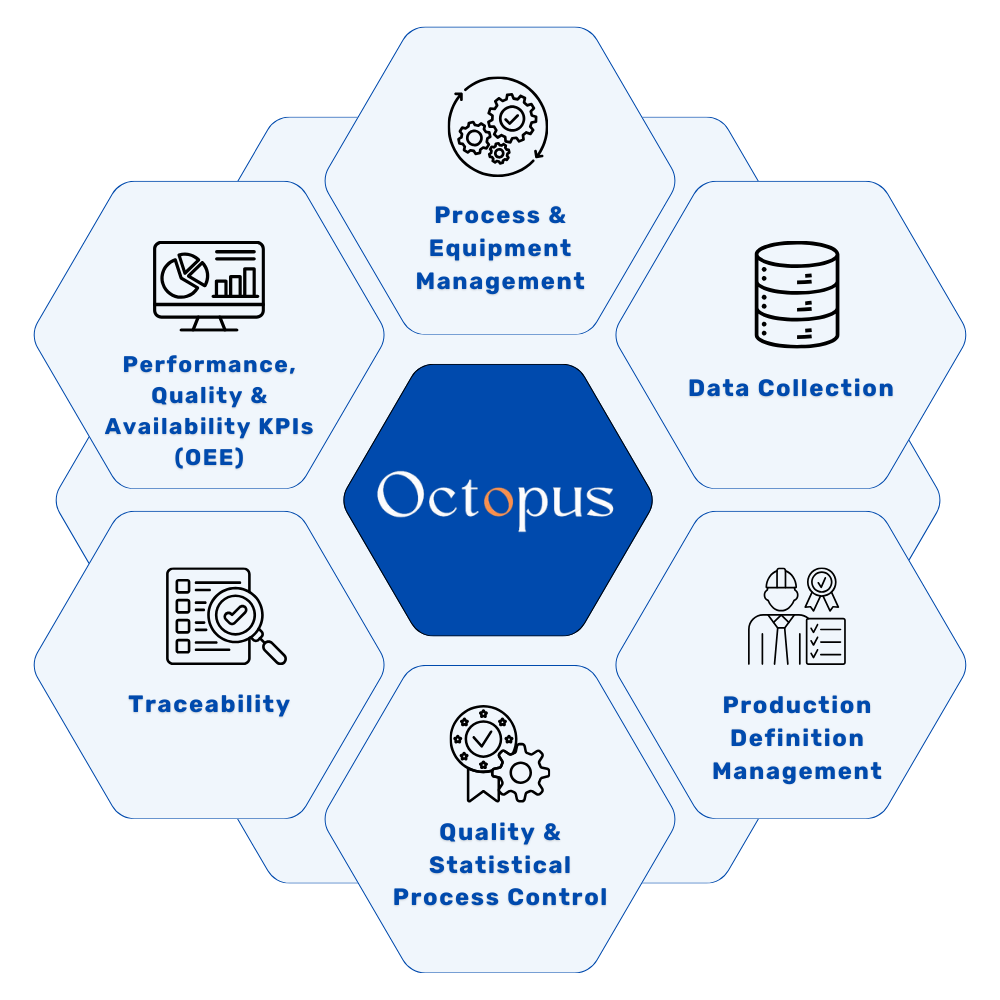Octopus - Manufacturing Execution System (MES)
MES acts as the bridge between production and enterprise systems, collects and stores production records, and helps make the production process more efficient.
About Manufacturing Execution System

It is a solution that provides greater visibility and transparency to manufacturing processes, favors compliance with regulations, reduces operational costs, and improves productivity and quality.
The Real-Time Production, QC and Logistics Monitoring webapp.
Streamline Your Production Process Management with Octopus
Octopus is a Manufacturing Execution System which can used in manufacturing operations to track and control the production process in real-time.

The Key Features
TRACEABILITY OF PROCESSES
MES implementation gives reduced risk of human error that would result from the use of incorrect or blocked components. Verification of the compliance process is easier and quicker. This is due to the full traceability of the production chain.
LESS PRODUCTION WASTE
Increased availability of machinery
Octopus MES makes maintenance faster by implementing systems for early notification of downtime and its causes. All this translates into more efficient monitoring of KPIs.
ANALYSIS OF MANUFACTURING PROCESS
MES system allows full access to data covering the manufacturing process in real time. This translates into better information flow and more efficient generation of data. When MES provides comprehensive. Octopus system directly indicates potential problems and bottlenecks in production. Octopus supports implementation of improvements into the production process.
TIMELY EXECUTION OF ORDERS
NOTICEABLE INCREASE IN PERFORMANCE
DATA PROVIDED IN REAL TIME
Real-time Product Tracking
Octopus allows you to track and monitor your chemicals in real-time, providing accurate inventory management, usage tracking, and automated alerts.

SDS Management
Octopus helps you to manage your Safety Data Sheets (SDS) in one central location, providing easy access to up-to-date information on chemical

Compliance Monitoring
Octopus provides tools to help you stay compliant with relevant regulations, such as OSHA, REACH, and GHS, minimizing the risk of fines or penalties.

Analytics and Reporting
Octopus offers advanced reporting and analytics tools, allowing you to track usage patterns, identify cost-saving opportunities

User-friendly Interface
Octopus has a user-friendly and intuitive interface, making it easy for users to access and manage chemical data

Customizable Workflows
Octopus allows you to create custom workflows to suit your specific needs, automating routine tasks
MES system allows full access to data covering the manufacturing process in real time. This translates into better information flow and more efficient generation of data. When MES provides comprehensive. Octopus system directly indicates potential problems and bottlenecks in production. Octopus supports implementation of improvements into the production process.
Octopus MES makes maintenance faster by implementing systems for early notification of downtime and its causes. All this translates into more efficient monitoring of KPIs.
MES implementation gives reduced risk of human error that would result from the use of incorrect or blocked components. Verification of the compliance process is easier and quicker. This is due to the full traceability of the production chain.
Octopus MES implementation is significantly more efficient waste management. The system provides real-time notification of defects. The data collected provides better monitoring of progress and volumes.
By implementing and applying MES and drill-down analysis, it is easier to find the real source of problems – the real causes that determine failure to meet deadlines. This process is critical for monitoring machine conditions, faults, and the resulting downtime. The result is far greater transparency in production – seen both from the perspective of the operators and from that of management.
The implementation of MES in business gives benefits for higher performance in general. The system ensures the identification of micro-stops which influencing the company’s performance. MES ensures full repeatability of certain processes in the factory – precise control over monitoring of changes and faster production start-up.
Octopus ensures that production data is provided in real time. This translates into the extremely important ability to make decisions based on current and up-to-date information. Data collection via plant operator, QC testing lab input ensures better assessment of production statuses and progress in real time. Although this advantage is mainly perceived through better, more efficient monitoring of KPIs or assessment of the real OEE value. Octopus MES provides the administrator or manager with a complete overview of all processes occurring in the company.
With Octopus You Can...
Improve product Quality
Reduces work-in-process
Improve Planning Process
Reduces Paperwork
Reduces Lead Time
Eliminates Lost Paperwork
Reduces or eliminates data entry
Empowers plant operations people
Reduces manufacturing cycle time
HOW WE'RE DIFFERENT
Consolidate Data and Turn Information Into Insights
Our results-driven strategies increase traffic to bring new leads that convert into new sales.

Digitalisation of process
Efficiency of process
Quality Efficiency
Product Documentation
New In
OCTOPUS
MES FeaturesDowntime data
Traceability
Planning schedule
Data Collection Systems
Current Challenges That Chemical Companies are Facing
Regulatory Compliance
Chemical companies are subject to numerous regulations at the local, state, and federal levels, which can be complex and difficult to navigate. Compliance requirements are constantly changing
Digital Transformation
The chemical industry is undergoing a digital transformation, which is driving new opportunities for innovation and growth. However, many companies are struggling to keep up with the pace of technological change and to effectively implement new digital solutions.
Cyber Security
Chemical companies are increasingly reliant on digital systems and technologies to manage their operations. However, these systems are vulnerable to cyber threats such as data breaches, hacking, and ransomware attacks.
Competition
The chemical industry is highly competitive, and companies need to constantly innovate and improve to stay ahead of their rivals. This includes investing in R&D, building strong relationships with customers and suppliers, and optimizing production processes to reduce costs and increase efficiency.
Safety and Risk Management
Chemical manufacturing and storage can be hazardous, and companies need to take steps to manage safety risks and ensure that employees and the surrounding community are not put at risk. This includes implementing safety protocols, providing training and resources, and conducting regular safety audits.
Product Development
Chemical companies need to constantly innovate and develop new products to stay competitive. However, product development can be costly and time-consuming, and companies need to carefully balance the need for innovation with the need to manage costs and risks.
Reputation Management
Chemical companies face public scrutiny and backlash for their impact on the environment and public health. Companies need to be proactive in managing their reputation, communicating their sustainability efforts, and engaging with stakeholders to build trust and transparency.
Environmental Sustainability
Chemical companies are under increasing pressure to reduce their environmental footprint and adopt more sustainable practices. This includes reducing greenhouse gas emissions, minimizing waste.
Our Best
Benefits

Improved Safety

Enhanced Compliance

Increased Efficiency

Cost Savings

Better Data Management

Improved Reporting

Mobile Access

Cloud Computing

